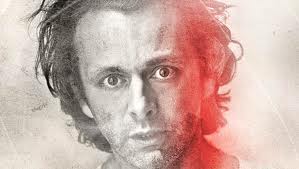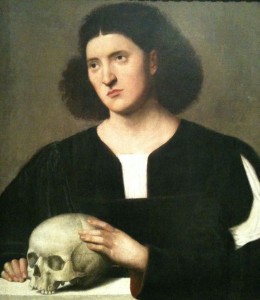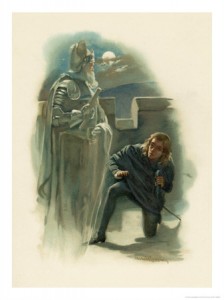According to author John Updike, “Hamlet is in fact the callous, egocentric villain of Hamlet”. This view was recently quoted in a posting on the Shakespeare Bulletin board SHAKSPER.
That’s quite a condemnation of probably the most famous of all fictional characters, and certainly Shakespeare’s best-loved hero.
He’s what makes the play so endlessly fascinating for both actors and audiences. We can all identify with elements of the complex and contradictory character Shakespeare created. Hamlet may be callous and egocentric, but aren’t we all, sometimes?
This painting, from around 1515, shows a beautiful and soulful young man contemplating a skull, signifying death. It was painted by a Venetian painter, and now hangs in the Ashmolean Museum,Oxford. We’d all, probably including John Updike, prefer this renaissance image of poetic melancholy. The Hamlet Shakespeare gives us, though, is full of contradictions. To him, man is both “the beauty of the world; the paragon of animals” and the “quintessence of dust”.
Although there are Italianate elements in the play, not least the reference to The Murder of Gonzago: “the story is extant, and written in very choice Italian”, the story of Hamlet comes from northern Europe. The Danish author Saxo Grammaticus gathered together many Icelandic and Norse sagas to create his history of Denmark, Historiae Danicae, in around 1200. One of these contains the story of Hamlet. Almost all the elements of Shakespeare’s play exist in this tale, but the Hamlet figure, Amleth, is more violent and bloodthirsty. The story is less subtle than Shakespeare’s: the murder of Hamlet’s father is not a secret needing a ghost to reveal it, Polonius’s murder is horribly grisly, and the story ends with Amleth setting fire to the palace, burning everyone inside to death.
Other plays on the subject were written and performed before Shakespeare’s, and though none have survived it seems likely that they introduced at least some of the changes from Saxo that Shakespeare went on to include. The resulting plot is then a blend of elements from this rough and brutal story with subtler details from earlier plays and Shakespeare’s own additions.
Actors playing this role always have to perform a delicate balancing act between these extremes. In the current production at the Young Vic the audience is prepared for the play to be set in a psychiatric hospital. From the first moment Michael Sheen’s wild-eyed Hamlet appears, taking his father’s greatcoat from his coffin and clutching it to his chest, they know not to expect him to be “The glass of fashion and the mould of form” that Ophelia later speaks about.
One of the most exciting scenes in the production is that in which Hamlet becomes the ghost of his dead father, his voice becoming deep and resonant, wearing his military greatcoat. Jonathan Pryce famously also spoke the ghost’s words when he played the prince, but he was possessed by the spirit of his father, Exorcist-style, whereas Sheen seems to adopt his father’s physical being.
It’s possible for the Ghost to almost take over the early part of the play, so powerful are his appearances. There is an old story that Shakespeare performed the part of the Ghost for himself, and many actors would relish speaking these terrific lines:
I could a tale unfold whose lightest word
Would harrow up thy soul, freeze thy young blood,
Make thy two eyes like stars start from their spheres,
Thy knotted and combined locks to part,
And each particular hair to stand on end,
Like quills upon the fretful porpentine.
This serious production has an outstanding central performance from Sheen, and some other great moments, but I wondered if the audience might be preoccupied by trying to make sense of the setting. The focus, as ever, is Hamlet himself, and I doubt if many people in the audience would agree that he’s the villain of the piece.
I’ve found a couple of interesting views by actors who have played the role with distinction. Here Simon Russell Beale talks about playing the part, and here Sam West demonstrates different ways of performing “To be or not to be”.
While writing this post, I heard that on Tuesday 6 December at 4.30 on Radio 4, Michael Sheen will be celebrating the Great Life of science fiction author Philip K Dick whose writings inspired his Hamlet. With a repeat on Friday 11pm, don’t miss it!





While actors may be able to capture aspects of the role; I have not yet seen a performance that does full justice to the part:
To quote from Dickens;
‘What man is there now living who can present before us all those changing and prismatic colours with which the character of Hamlet is invested?’
(Dickens, Charles. The Life and Adventures of Nicholas Nickleby, edited with an introduction by Mark Ford (London: Penguin, 1999) p301
For me, the essence of Hamlet transcends the details of plot and situation. This is Shakespeare at his apotheosis and he uses the Gonzago story and the revenge tragedy genre as a mere starting point to carry out a profound and fundamental exploration, through the flawed, self-absorbed and often crude Hamlet, into “this quintessence of dust.” For me, “to be or not to be?” does not equal “should I kill myself?”. It is a much deeper question: what is the point of existence?
See my post at http://theyweewords.blogspot.com/2011/12/best-hamlet-of-all-time.html to see why I believe Ian Charleson’s Hamlet at the Olivier in 1989 was the best Hamlet ever.
Thank you for your comment. I wasn’t able to see Charleson’s Hamlet but I know many people share your opinion.
I was lucky enough to play Hamlet many years ago and the performance which made sense of the play for was Mark Rylance’s at the RSC in 1989. I didn’t see Simon Russell Beale do it but I agree with everything he says in the interview, Hamlet isn’t mad, he’s grieving, he isn’t violent towards his mother, he’s understandably and justifiably shocked by the fact that she remarried before Hamlet even made it home for his father’s funeral and the Folio has put ‘To be or not to be’ in the wrong place, it belongs in Act 2 where the Quarto had it!
Thank you for your comment Andrew. It must give you a quite different perspective having played Hamlet yourself. Did you feel intimidated by the thought of all those who’d played the part before?
To be honest, Sylvia, no. I liked the fact that there were so many different interpretations to look at and think about and I loved the idea that at any given moment there are probably only a few people who have learned the part and that year, briefly, I was one of them. I used a recording of Derek Jacobi to help learn my lines and I discovered new interpretations of the relationships within the play and new possibilities for how to say the lines, as well as different versions of the text, from every recording I was able to see or hear and the performances I hated (Daniel Day Lewis, Mel Gibson, Kenneth Branagh’s first shouty attempt on stage) were as instructive as the ones I loved.
Vilian or not, Shakespeare created an individual in Hamlet with which we sympathize. I’ve found the same thing in Lady Macbeth. It’s hard not to feel the intensity of her suffering as shown in her sleepwalking scene. I recently heard an old live recording of Verdi’s opera, Macbeth, in which Lady Macbeth’s aria of her sleepwalking scene brings down the house. The audience reaction had nothing to do with exulting in its revenge of her degredation. At that point I realized Verdi’s great recognition of Shakespeare’s insight into her character, human condition.
Thank you for your comment, which really makes me want to listen to Verdi’s opera Macbeth – I don’t know it. I love it that Shakespeare provides inspiration for brilliant work by other creative artists.
Pingback: Shakespeare’s Hamlet as a Mental Patient |